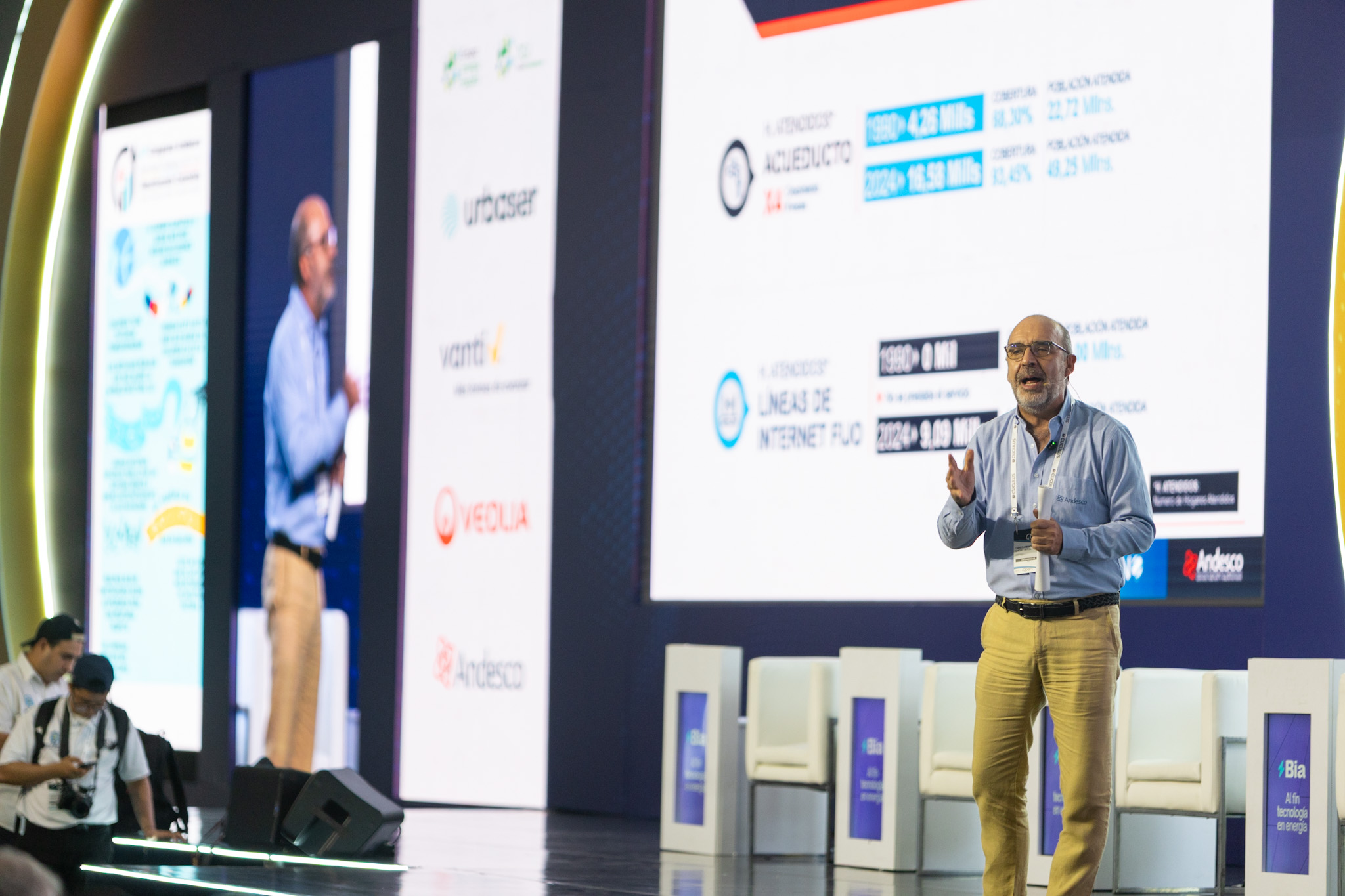'Bad decisions result in higher costs for the poorest': Andesco warns about government initiatives

The 27th Andesco Congress brought together Colombian public service companies in Cartagena. They lamented the absence of Superintendent Yanod Márquez and Minister of Mines and Energy Edwin Palma to discuss the challenges and concerns facing the sector.
Although the minister did not attend the event, he announced from Valledupar a bill to lower electricity rates and the intention to eliminate the reliability charge paid by users to guarantee the electricity supply during an El Niño event.
For Camilo Sánchez, president of Andesco and also of the National Trade Council, the national government is mistaken in proposing these initiatives and warned that "bad decisions result in higher costs for the poorest."
He also stated that the decision by Moody's and Standard & Poor's to lower Colombia's credit rating "will make loans more expensive for entrepreneurs investing in our country. This shouldn't have been happening."

27th Andesco Congress Photo: Andesco
We need to change our narrative. At Congress, we talked about national dialogue, but government representatives didn't attend. The most important public services body, the Andesco union, was here.
The event focused on solutions and realities, not promises. Companies like ISA, EPM, Enel Colombia, and Grupo de Energía Bogotá (GEB) delivered results, not promises.
The superintendent of public utilities was conspicuous by his absence. The Superintendent of Public Utilities has always been the guest of honor, and on this occasion, he hid his memory to avoid discussing fundamental issues such as natural gas and electricity. We can't turn something that is extremely technical into a political issue.
The superintendent of public utilities was conspicuous by his absence.
Companies continue to believe and invest. We demand legal certainty because the rules of the game are changing. This reduces investment and causes it to go elsewhere, but worse still, it slows down the country's economy.
We invited Minister Edwin Palma to the Congress, and he had a stage with 4,000 people so we could reach common ground from our differences. He can't come up with nonsense like there's only one good party here.
There are ideas, budgets, investments, and results here. I don't want to keep hearing about bills, elevated trains from the Atlantic to the Pacific, and for them to forget that the energy and natural gas subsidies for 2025 must be delivered because there are no funds in the General National Budget.
Furthermore, if investments aren't made in the electricity transmission grid, we'll have many blackouts across the country. This has already happened in Chile, Argentina, Ecuador, and recently in Barranquilla.

Photo: iStock
Minister Edwin Palma doesn't like it when we tell him there's going to be a blackout. Colombia hasn't shut down because, with the Comptroller's Office and the Attorney General's Office, and with a warning message, they made him pay the subsidies. The government didn't want to pay them; they were delayed.
Currently, Air-e doesn't have the money it needs to maintain its investments in the Caribbean region, and that's why we're concerned.
Additionally, Minister Palma announced a bill to lower electricity rates. This is useless and has yielded no results anywhere in the world where it has been implemented. This measure could be used against users.
The National Government didn't change Law 142 or Law 143, and now it's telling us that in eight months it will process a law to lower electricity rates.
Why is the bill announced by Minister Palma inconvenient? We already have cross-subsidies in this country. Currently, strata 5 and 6, as well as the commercial and industrial sectors, pay a 20 percent surcharge on their energy bills.
Furthermore, it's important to keep in mind that in many areas of the country, users have already paid for the tariff option, and now they want to charge it again.
There's also a goal to include stratum 4 households in this payment, something that's never been done before. Minister Palma is truly mistaken. Therefore, dialogue is important so that, through working groups, we can make progress. Bad decisions result in higher costs for the poorest.
The government is paying lip service to the poor, but what it's actually doing is charging the poor more because they don't really know how to process a bill.
Unions are key to reaching agreements, but the government believes it has to fight us. That's a mistake; that's why the Minister of Mines and Energy lacks enthusiasm and courage for the future.

Andesco President Camilo Sánchez. Photo: Andesco
That's not a decision the Minister of Mines and Energy can make, as it must be processed through the Congress of the Republic and the Energy and Gas Regulatory Commission (Creg). I realize there's a deep lack of knowledge.
Additionally, a change of this magnitude doesn't happen overnight; it takes time. It's just another "bubble," and while they keep saying "bubbles," what they're doing is increasing our debt.
This decision will make credit more expensive for business owners who are investing in our country.
This decision means that our business owners, without doing anything wrong, will see their costs go up because they will start being charged higher interest rates.
This decision will make loans more expensive for business owners investing in our country. This didn't have to happen.
It's very important not to make announcements or speculation, because when we're penalized by credit rating agencies, businesses incur additional costs, and ultimately, users will end up paying those additional costs in utility rates.
Investors need legal certainty because when the rules of the game change, investments move to other countries like Argentina, Chile, or Peru.

Photo: iStock
We respect public powers; in fact, we have often applauded the Congress of the Republic. In this specific case, Congress legislated, although it is not what we would have wanted, but that is the voice of the people and it is a fundamental public power.
Therefore, we accept what must be accepted, but we always encourage consensus, dialogue, and respect.
We hope the government doesn't throw any more balloons and doesn't fight with those who shouldn't. The unions remain, the companies carry out the projects, and the governments pass.
The National Government does not have to make us fight with them.
Don't improvise; prioritize the payment of energy and natural gas subsidies in the General National Budget. We must also prevent the continued politicization of institutions and prevent the Creg from becoming technical and appointing its six commissioners, as it has been operating for three years with only four.
The most important thing is that users are our reason for being, and the National Government doesn't have to make us fight with them. We work for users and to level the social playing field of the economy.
We're not in opposition; we provide the technical expertise, even if the government doesn't like what that means. We must have a dialogue, but the minister is playing politics.
I am the president of the National Trade Union Council. I'm not in the opposition nor a candidate for anything. I defend democracy and the business sector, which generates 75 percent of formal employment in the country.
eltiempo





